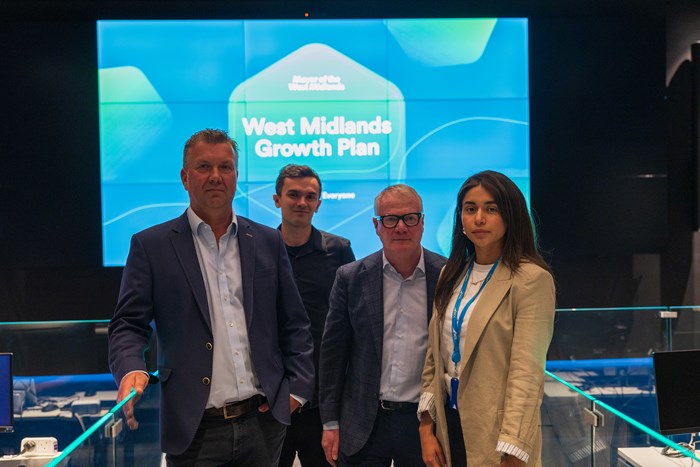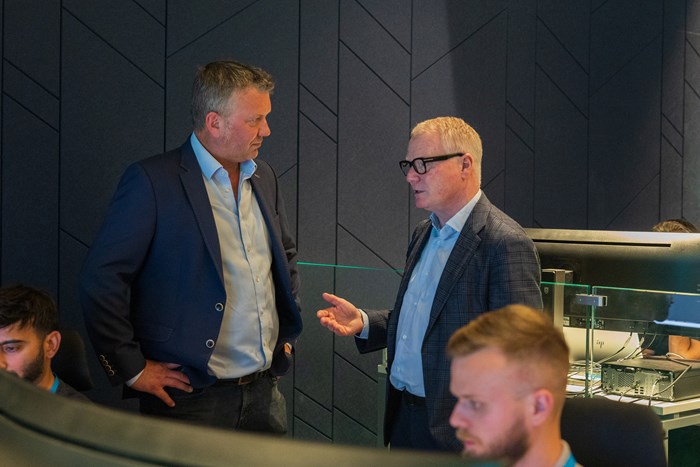Mayor announces bold ambition to give every adult free Artificial Intelligence skills training
Published: Thursday 07 Aug 2025
A bold ambition to make the West Midlands the UK’s number one place for Artificial Intelligence (AI) skills training has been set out by Mayor Richard Parker as part of his Growth Plan.
The goal is to give every adult in the region free training in how to use AI in their everyday lives at home, work or in the community, with further opportunities for thousands more to develop the technical skills needed to land jobs in an increasingly technology dominated workplace.
The Growth Plan’s AI training package, backed by £10m, also includes proposals for a pioneering, regionwide AI Academy to be set up under a joint project between the West Midlands Combined Authority (WMCA), leading tech companies, colleges, universities, specialist providers and community groups.
The Academy would provide local people with clear career routes into AI, digital and data jobs as well as upskilling existing workers so they can help drive economic growth and higher productivity.

Mayor Richard Parker (second right) and Dan Cartter, SCC's director of innovation (left) with Rose Palacios and Callum Woodford, who are AI and innovation consultants at SCC
The West Midlands is already one the UK’s most active AI hubs, with more than 140 AI companies employing 69,500 people, contributing £5.5 billion to the economy each year. The three-year AI training programme set out in the Growth Plan seeks to build on this foundation.
The Growth Plan was launched by the Mayor last month to provide a blueprint to reboot the regional economy, raise living standards, and put an extra £8,600 back into the pockets of working people.
It sets out to drive a new era of prosperity by creating 100,000 good jobs in fast-growing industries such as digital and AI technology, advanced manufacturing and finance, health and medical technology.
Research shows that communities with AI-trained workers are better positioned to start new businesses, improve public services, and modernise local industries.
The Mayor made his announcement on AI training during a visit to Tyseley, Birmingham, at the global headquarters of SCC, Europe’s largest independent IT service provider. SCC uses cutting edge AI and other computer technologies to help companies innovate and become more productive.
The Mayor said: “In an age where artificial intelligence is revolutionising industries, the need to give all our communities the AI skills to secure high quality jobs is economically imperative.
“As jobs become increasingly digital and data-driven, AI will become a core skill just like English or maths. So, if we don’t make AI skills training a priority and readily available to all, then lots of people risk being left behind.
“That’s why I want to make the West Midlands the number one place in the UK for AI skills training. Avoiding an AI skills divide isn’t just a matter of fairness - it’s crucial to our Growth Plan.”
The region has dozens of companies actively developing and applying AI across sectors like manufacturing, healthtech, fintech, creative industries, retail and public services.
The University of Birmingham applies AI in health and robotics and is a Turing Institute member. Coventry University and the Digital Futures Institute at Aston University are leading in areas like cybersecurity, fintech and supply chains, and the University of Wolverhampton has launched the Centre for Cyber Resilience and AI, while pioneering sustainable computing to reduce the power needed to train and run large AI models.

Mayor Richard Parker discusses the future of AI with SCC's director of innovation Dan Cartter
During his visit the Mayor met with Rose Palacios and Callum Woodford, who are now both working at SCC as AI and innovation consultants after graduating from university.
Rose, who is originally from Peru, had been studying in the USA but chose to come to Birmingham to do a master’s degree in Artificial Intelligence at Aston University.
“There are a lot of misconceptions about AI,” she said. “But it’s simply a tool that can be used for anything that is knowledge related.
“I use it to help companies be more productive. I’ve just been working with an engineering firm which previously took 12 days to produce a quotation for their customers. Using AI we cut this to just six seconds and that time savings has transformed their efficiency and productivity. That’s the power of AI.
“But I also use AI in my everyday life to help maximise my time and make tasks easier. It’s a case of getting familiar with AI and making it your friend.”
Dan Cartter (crct), SCC’s director of innovation, said: “Around 65% of young people coming through education right now will have job roles that don’t even exist today.
“These will be new jobs and many of them will involve cutting edge technologies including AI.”
The World Economic Forum estimates that more than half of all employees will require reskilling or upskilling over the next few years due to the rapid pace of AI adoption.
Failing to invest in widespread AI education could result in talent shortages, reduced competitiveness, and slower economic recovery.
The £10m for inclusive AI innovation is part of a wider £30m package included in the Growth Plan to provide support for bold, local skills initiatives. It will fund locally driven solutions to turbocharge jobs and skills support and tackle deep-rooted barriers to opportunity, productivity and inclusion.
The wider package also includes £10m to develop bespoke training programmes that businesses can shape and invest in to give people the skills to work in fast growing sectors of the economy like green technology, advanced manufacturing and construction.
Another £10m will be used to develop a more inclusive, locally driven skills system. Working in partnership with local authorities and voluntary, community, faith and social enterprise organisations it will help marginalised communities, including disabled people, into better work.
Further enquiries
For all other enquiries from members of the public go to our contact us page: https://www.wmca.org.uk/contact-us/